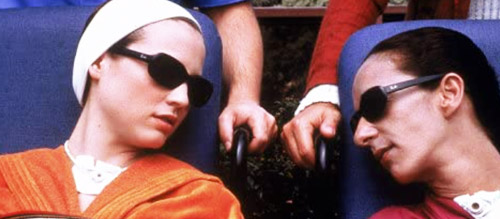Where to Start with Pedro Almodóvar
With an acclaimed career spanning over 40 years and 22 feature films to date, Spanish auteur Pedro Almodóvar’s career can seem a daunting one to the uninitiated, but it has proven to be an endlessly rewarding catalogue of work to those in the know.
Born in 1949 and coming to prominence in La Movida Madrileña (the Madrid Scene), a flourishing and liberating creative movement brought about following the death of dictator General Franco, Almodóvar began his career as an actor but moved into directing and soon became one of the most distinctive, celebrated and popular Spanish filmmakers of all time.
Almodóvar has won two Academy Awards, for All About My Mother (Best Foreign Language Film) and Talk to Her (Best Original Screenplay), and has nine nominations and two wins (for All About My Mother and Volver) at the Cannes Film Festival to his name
Almodóvar’s films are vibrant, designed to within an inch of their lives, intense and thematically layered experiences, and he has persistent fascination with issues of sexuality, gender and Spanish national identity throughout his filmography. Almodóvar films are also often darkly, even morbidly funny experiences.
His characters, often played by regular collaborators such as Penélope Cruz, Antonio Banderas and Carmen Maura, aren’t always the easiest people to like but they are always memorable. Filmmaker-addicts, self-loathing members of the LGBTQ+ community, voyeurs and the odd sadist and psychopath populate the Almodóvar universe, along with star-crossed lovers, passionate artists and saintly mothers. His characters tend to lean towards self-sabotage and sometimes abusive behaviours, and are always fascinatingly, humanly flawed individuals.
This is The Film Magazine’s recommendation of one avenue to introduce you to Almodóvar’s vivid world, three films that set the tone and could conceivably sum him up as a filmmaker. If you like them and if they speak to you, then there’s plenty more where they came from.
1. Women on the Verge of a Nervous Breakdown (1988)
Women on the Verge of a Nervous Breakdown broke Almodóvar through on the international stage in eye-catching and completely self-assured fashion. This is one of the maddest soap opera farces that you’re ever likely to see, and the perfect introduction to comedy, Almodóvar-style.
Inspired by Jean Cocteau’s “La voix humaine” (in English “The Human Voice”, a title that rears its head throughout Almodóvar’s career, most recently his Tilda Swinton-starring short film), Women on the Verge follows Pepa (Carmen Maura), a TV and voice actress distraught by a bad breakup from a fellow actor despite his well-known indiscretions. Through a complex series of events, a suicidal friend, a house-hunting couple (including Antonio Banderas as a previously unknown stepson), a cop, a phone repairman and a gun-toting woman with a history of mental health problems all end up at Pepa’s flat.
The penthouse apartments and balconies that much of the film takes place in look intentionally stagey and theatrical, a heightened, colourful reality and one that Almodóvar often drifts his narratives through.
Not many directors could deliver a coherent narrative involving affairs, suicide attempts, a terrorist plot, spiked gazpacho and an armed madwoman in a candy pink suit, but Almodóvar somehow manages it to hugely entertaining effect.
2. Talk to Her (2002)
Theatrical, bordering on operatic, and morally twisted but also emotionally genuine and quite darkly funny, Talk to Her is one of several of Almodóvar’s masterpieces, a prototypical melodrama in his style.
Two men, Benigno and Marco (Javier Cámara and Darío Grandinetti) are in love with two different women in comas, and strike up a fast friendship as they converse at their hospital bedsides. So far, so sweet. But one is a journalist who fell for his interviewee, a glamorous bullfighter, and the other was stalking the dancer he obsessed over before her lapse and is now her nurse, allowed the most intimate and amoral one-way relationship imaginable.
It’s quite difficult to like Benigno unconditionally – he brings with him too many red flags – but you do pity him and completely understand why Marco would stand by him in a world which would condemn him for his actions, a warped world seen from his sad, twisted point-of-view. This becomes a heartbreaking tragedy far beyond the women trapped outside time, it’s all about the pain of failing to communicate and express your feelings, how it destroys a person and uproots them from reality. Speaking of being uprooted from reality, the film features one of the strangest and most memorable psychosexual dream sequences ever committed to film and it needs to be seen to be believed.
This is Almodóvar demonstrating his mastery of tone – comedy, drama and everything that falls in-between – all brought to life by a superlative cast performing a bold and insightful script enlivened by an evocative use of music from composer Alberto Iglesias and dazzling visual flourish throughout.
3. Pain and Glory (2019)
Almodóvar has made several films about narcissistic gay filmmakers, but Pain and Glory is probably the best of the bunch, and probably the film that draws the most directly from his own life and career.
An acclaimed filmmaker reluctantly agrees to a career retrospective as he battles health problems, addiction and relationships past and present haunting him. Salvador Mallo (Antonio Banderas) reconnects with his most successful film’s lead actor Alberto (Asier Etxeandia), begins using heroin in order to feel something and recalls his childhood – his sexual awakening, loves, loss, and artistic success and struggle – in a tiny countryside village
Salvador is Almodóvar in pretty much all but name; gay, stylishly dishevelled and navigating many significant passages for the director’s life, such as their shared struggles with substances and crippling back pain, issues that drive his fictionalised counterpart in his creative endeavours.
Aside from the clear autobiographical elements of the story, Almodóvar also brings a meta twist into play with the film’s ending, the description of which will be left vague here so as not to ruin the surprise, but suffice to say it smartly recontextualises everything we have just seen and come to learn about Salvador, bringing with it bonus emotional clout.
Recommended for you: Where to Start with Paul Verhoeven
Pedro Almodóvar has produced a incredible body of work that is instantly recognisable even to the casual viewer. His films are flamboyant, sexy, funny and full of life. He dislikes being labelled as a “gay filmmaker” but it is completely understandable why his work has made such an impact and is so popular with LGBTQ+ audiences, because of the genuine, empathetic and entertaining way he tells stories from their world. Almodóvar and his regular collaborators both in front of and behind the camera make films about real people, people with flaws and eccentricities and manias, people who may be outcasts from society or trapped as the victim or the perpetrator in an abusive relationship; all of whom need to face up to who they really are and love who they want to love in order to find true happiness.




